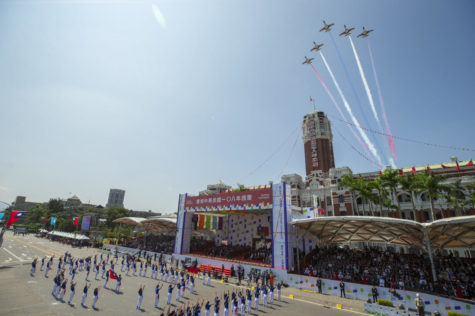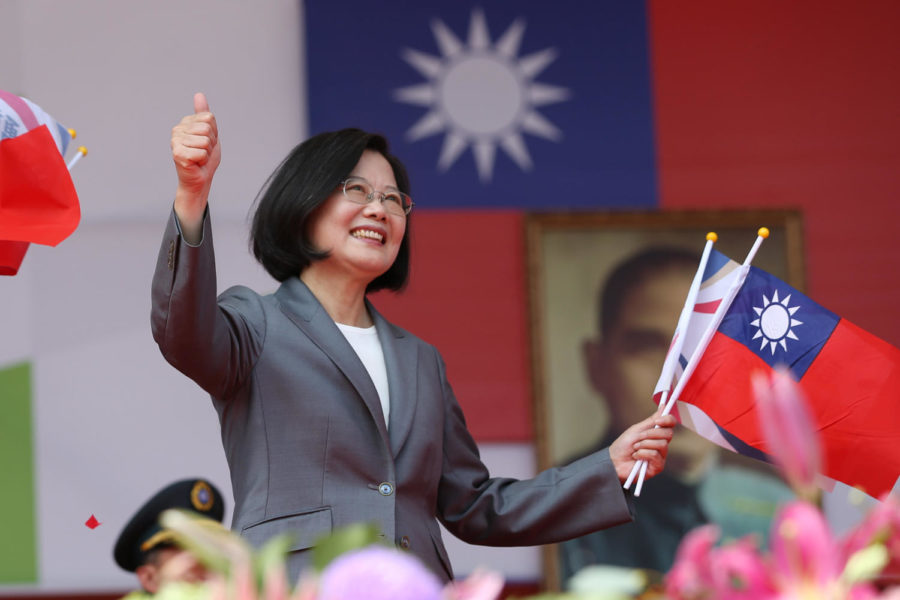Taiwan Rejects China’s “One Country, Two Systems” Proposal Amid Hong Kong Protests
President Tsai Ing-wen gives a thumbs up during her speech on Oct 10. Photo credit: Simon Liu / Office of the President of the Republic of China (Taiwan).
On Oct 10, the Republic of China (Taiwan) celebrated their national day, which is also called Double Ten day.
The holiday occurs on the annual anniversary of the Wuchang Uprising, which occurred on Oct 10, 1911. The uprising was part of the Xinhai Revolution, which led to the formation of the provisional government of the Republic of China (ROC) on Jan 1, 1912. The first president of the ROC was Sun Yat-sen and helped set up the provisional government in Nanjing, which is in the present People’s Republic of China (PRC).
On Feb 12, 1912, the six-year old Xuantong Emperor (Puyi) abdicated the throne, bringing an end to both the Qing Dynasty and 2,000 years of imperial China. This set the stage for the Chinese civil war between the Communists and the Nationalists.
During the holiday, the Taiwanese President, Tsai Ing-wen commented on both the Hong Kong protests and the further breakdown in relations between China (The People’s Republic of China) and Taiwan.
“Not far from Taiwan, Hong Kong is on the verge of breakdown due to the failure of “one country, two systems.” Nevertheless, China is still threatening to impose its “one country, two systems” model for Taiwan. Their [China’s] diplomatic offensives and military coercion cause a serious challenge to regional stability and peace,” said Tsai Ing-wen.
The “diplomatic offensives” which the Taiwanese President is referring to is the position that the Central People’s Government, the Chinese Communist Party and the rest of the Chinese government have referring to Taiwan. China believes in the “One China Policy” which follows the idea that Taiwan is part of China.
The basis for the “One China” policy is the 1992 consensus. The meeting between representatives from both China and Taiwan concluded that there is only one China, opening up the idea of more unity across the Taiwan Strait.

But, the party in power in Taiwan at the time was Kuomintang, which is more “pro-China” than other Taiwanese parties. The overall consensus from the 1992 meeting is disputed due to politics in Taiwan, but not in China.
During the Oct 1 National Day celebrations in Beijing, which commemorated the 70th anniversary of the People’s Republic of China, Chinese President Xi Jinping voiced his outlook on the continuing Taiwan issue. “Forging ahead, we must remain committed to the strategy of peaceful reunification, and ‘one country, two systems,”” said Jinping according to CNBC.
Jinping’s speech was the polar opposite of the one given by Tsai on Oct 10. “The overwhelming consensus among Taiwan’s 23 million people is our rejection of “one country, two systems” regardless of party affiliation or political position,” said Tsai Ing-wen.
Ever since Tsai took power in 2016, her administration has been at odds with Beijing. She is a member of the Democratic Progressive Party in Taiwan and she ran on a platform which was much more unfavorable to Beijing than other candidates. Tsai also became the first female president in the entire history of the ROC.
So far, Tsai Ing-wen has legalized gay marrage in Taiwan and a number of other domestic policy measures. In the year of 2019 alone, the ROC has suffered the loss of loosing diplomatic status with Kiribati and the Solomon Islands. The ROC as of writing is recognized by 15 nations including the Marshall Islands, Belize, and the Holy See.
The ROC was at one point recognized by many countries because it was on the United Nations. However, the ROC was kicked out of the United nations in 1971 and replaced with the PRC. Soon after, many nations began to recognize the PRC instead of the ROC, like the United States.
The unofficial relationship between the US and the ROC is enshrined in the Taiwan Relations Act, which was enacted in 1979. The strong bilateral relations between the two nations have allowed the US to sell F-16 fighter jets, former US Navy ships, and other military equipment to the ROC.
In an interview with CNN, Tsai said that she would run for a second term as president. According to political analysts, the current political crisis in Hong Kong has positively effected her probability of getting re-elected in 2020.


